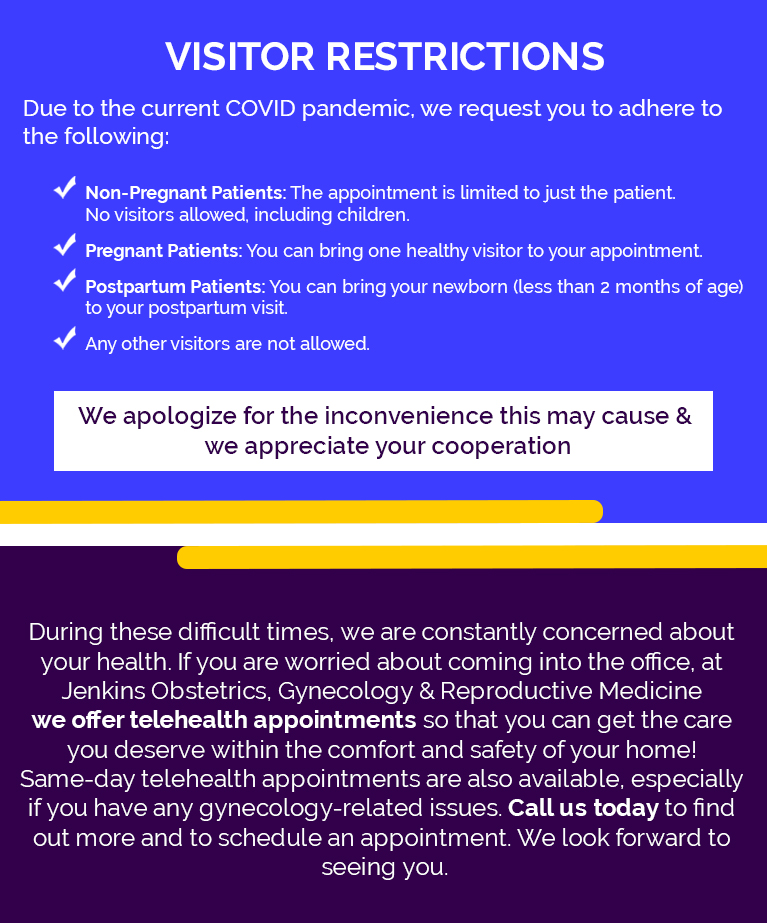

10
Apr
Physical Changes throughout Pregnancy

As your baby grows, your body will undergo several changes. We are here to help you manage your health and wellness as you prepare for childbirth.
Nausea
Nausea and vomiting during pregnancy are often referred to as “morning sickness.” This is inaccurate, because many women experience nausea throughout the day. The good news is that nausea is typically limited to weeks 4-6 to week 16. Although it seems the majority of morning sickness resolves after the first trimester, there are pregnancies during which nausea persists much longer.
If you experience nausea and vomiting during your pregnancy, it is important to listen to your body. There are several things that can be done to minimize unpleasant sensations. However, what works for one may not work for another.
Dietary suggestions for nausea include:
- Always eat breakfast.
- Drink plenty of water between meals. Fruit juice is also acceptable.
- Eat smaller meals, but eat more frequently. Nausea may be triggered by an empty stomach.
- Limit or avoid high-fat and spicy foods, which can be difficult to digest.
- Eat slowly to avoid getting too full.
- Eat plenty of fiber, which can be found in leafy vegetables, bran, and fruit.
- Take 25mg of vitamin B6 up to 4 times a day.
- Take 1/4 to 1/2 tablet of Unisom before bed.
Rest is necessary for the growing baby and for the mother-to-be. Inadequate rest can cause or exacerbate nausea, so don’t feel bad about taking a mid-day nap.
Remember that most bouts of nausea resolve sometime around the beginning of the second trimester. Until this time, give yourself the extra TLC you need.
Let us know if:
- You cannot keep down solid food for 24 to 48 hours.
- Liquids cannot be kept down for 24 hours.
- You develop a temperature higher than 100.4
Frequency of Urination
Your frequency of urination may increase as your baby develops. Let us know if frequent urination is accompanied by a foul odor, blood in your urine, low back pain, or a burning sensation.
Constipation
Constipation is a common complaint in pregnant women. This difficulty may be due to additional iron intake from prenatal vitamins, hormonal changes, or inadequate fluid intake. Tips for handling constipation include:
- Eat a high fiber diet
- Stay hydrated
- Exercise on a daily basis if possible
If necessary, you may take Milk of Magnesia, a stool softener, or Miralax.
Fatigue
It is normal to need more rest during pregnancy. Due to consistently fluctuating hormones, you may feel chronically fatigued even when you are sleeping more. Listen to your body and rest as much as possible.
Exercise
If you have a daily exercise regimen, keep it up! If you are just getting started, try walking for 10 to 15 minutes a day, working your way up to about 40 minutes of gentle daily exercise.
- Exercise is vital to a healthy pregnancy, unless your doctor advises against it due to certain complications.
- Do not work out to the point of being out of breath. Longer is better than harder.
- Because you will sweat more, be mindful of staying hydrated during pregnancy.
- After your 5th month, avoid exercises that require you to lie on your back, as this can affect blood flow to the baby.
- Remember that your center of gravity will change throughout pregnancy, affecting your balance. Avoid exercise that may cause you to fall.
Recommended types of exercise include:
- Low impact aerobics
- Walking
- Hiking
- Swimming
- Yoga
- Stationary bike
Types of exercise to avoid during pregnancy include:
- High intensity exercise
- Scuba diving
- Rock climbing
- Horseback riding
- Downhill skiing
Eating Right
A healthy, balanced diet is crucial during pregnancy. As your baby is developing, your body requires an additional 100-300 calories per day. The additional calories can be met quite easily with an extra half a sandwich and small glass of milk.
Cramping
Menstrual-type cramping is a normal sensation during your first trimester. This is an indication that your uterus is expanding to accommodate your growing baby. If bleeding also occurs, contact our office right away.
Breasts
You may go through several changes in bra size during your pregnancy. Breasts tend to enlarge and feel more tender during the first trimester, as there is an influx of estrogen and progesterone.
Headaches
Headaches during pregnancy may stem from caffeine withdrawal, stress, inadequate sleep, and hormonal changes. If you experience chronic or severe headaches, contact our office.
Vaginal Discharge
You may naturally experience an increase in vaginal discharge during your pregnancy. If you notice a foul odor, itching, burning, or a change in color, schedule a visit with us.
Heartburn
Heartburn and indigestion may occur as stomach acid rises into your esophagus, causing a burning sensation.
Round Ligament
The round ligament spans the uterus to each side of the groin. As this ligament stretches, pain may occur in the lower abdominal and vaginal areas, as well as the legs.
Back Pain
Back pain may develop as a result of shifting and rising of the uterus, postural changes, and weight gain. In the latter stages of pregnancy, a support belt may be worn to alleviate back pain.
Bleeding Gums and Nose Bleeds
Due to the significant increase in blood circulation during pregnancy, it is not uncommon to notice bleeding gums or to experience an occasional nose bleed. Unless bleeding gums are also red and painful, the condition is nothing to worry about. In addition to noticing a bit of blood when you blow your nose, you may also feel slightly congested simply due to swelling in the mucous membranes.
Shortness of Breath
As the uterus pushes up on the diaphragm, lung capacity may diminish, causing you to feel short of breath. If chest pain also occurs with shortness of breath, contact our office.
Hemorrhoids
Some pregnant women experience hemorrhoids, which are enlarged veins around the rectum. This problem, which can cause itching and burning, may be caused or worsened by constipation. For tips on maintaining healthy bowel movements, contact our office.
Insomnia
Many women have increasing difficulty sleeping through the night as they get closer to delivery. This could be partially due to frequent urination at night, physical discomfort from the large abdomen, or the emotional excitement of the impending birth of a new family member. To improve sleep, use a pillow to support comfortable posture. You may also take Tylenol PM or Benadryl.
Leg Cramps
Muscle cramps in the lower legs are a common occurrence during the second and third trimesters. Taking calcium, magnesium, and potassium may decrease discomfort, which often occurs at night.
Swelling
The lower extremities can become swollen more easily during pregnancy, as may the hands. When possible, avoid standing for long periods. Also avoid lying on your left side. If necessary, you may manage swelling in the lower legs with compression stockings.
Varicose Veins
Weakening in the veins that carry blood back to the heart can lead to blood pooling in certain areas. These veins are called varicose veins. They most often develop in the ankles and legs, and may be accompanied by pain. To minimize your risk of varicose veins:
- Avoid sitting with your legs crossed
- Avoid standing for long periods
- Elevate your legs when you can
- Exercise on a daily basis
- Wear compression stockings to minimize swelling
855-346-8610
281-347-2600
Stretch Marks
As much as we would like it, there is no way to prevent stretch marks from developing as skin reaches maximum elasticity. These marks are the result of connective tissue stretching, so cannot be minimized with an external cream.
Sexual Intercourse
In a healthy pregnancy, sex does not pose a risk to the baby, and can continue as long as you feel comfortable. Your physician will discuss recommendations if you have a condition that may prevent you from continuing sexual intercourse, such as a placenta problem or an incompetent cervix.
Avoid sexual intercourse if your doctor advises against it, if you have vaginal bleeding or watery discharge, or if you have abdominal or vaginal pain.
Warning Signs in Pregnancy
Certain symptoms may indicate the potential for a pregnancy complication. Any of the following should be evaluated by your doctor as soon as possible:
- Burning upon urination
- Sudden or persistent nausea or vomiting after 12 weeks
- Vaginal bleeding
- Severe headaches that do not improve with medication
- A gush or leakage of vaginal fluid
- Chills or temperature over 100.4
- Spots or flashes of light before your eyes
- Loss of consciousness
Limitations
- Alcohol affects your developing fetus and should not be consumed during pregnancy.
- Caffeine also affects the baby, and should be limited to no more than 200mg daily.
- Unpasteurized foods can contain Listeria, bacteria that may infect the amniotic fluid around your baby. Avoid foods that have not been pasteurized. Check labels carefully.
- Fish can contain mercury. Types that tend to contain higher levels include tuna, tilefish, shark, king mackerel, and swordfish. Consume no more than 8oz. of these types of fish each week. You may eat shellfish if it is properly prepared.
- Aspirin and other medications, including Alka Seltzer, Pepto Bismol, Ibuprofen, Advil, Aleve, and Motrin, can cause bleeding or pregnancy complications. If necessary, take Tylenol as directed by your physician.
- Cat litter should be avoided altogether if at all possible, as litter and soil may contain the parasite toxoplasmosis. If you must clean a cat box, wear rubber gloves, and wash your hands thoroughly. Also be extra careful to wash fresh fruits and vegetables.
We are here to support you through a healthy pregnancy. Call our office if you have any questions.
Share this Article
Jenkins Obstetrics, Gynecology & Reproductive Medicine
Connect with Dr. Jenkins on Linkedin





We offer general care, gynecology, and obstetrics services that span all stages of a woman's life. Dr. Taryll L. Jenkins, MD received his undergraduate degree from Louisiana State University and Doctorate of Medicine from Meharry Medical College School of Medicine, TN. He completed his residency training at the University of Texas and Hermann Hospital, TX and is Board-certified from the American College of Obstetrics and Gynecology, with years of research experience.
Having graduated from the University of Texas at Arlington with a Bachelors of Science in Biological Chemistry in 2011, Dr. Stephanie Roy received her Doctor of Medicine Degree in 2015 from the University of Texas Medical Branch. Today she is a leading Board-certified physician who works hard to provide you and your family with high quality services. In addition to spending time at the practice, Dr. Roy possesses extensive volunteer experience in the community. She was also a tutor at the Medical Careers Diversity Program in 2012 and since then has spent her free time volunteering for the St. Vincent’s Clinic.
Dr. Tiffany Ikwuagwu is passionate about caring for the diverse communities in Katy and Houston, TX. Having completed her undergraduate degree at the University of Houston, her medical degree at the Baylor College of Medicine, and her residency in obstetrics and gynecology at the McGovern Medical School, she worked as principal investigator on a research project with Dr. Nana Ankumah at UT Houston. A member of the American Medical Association, Texas Medical Association, and American College of Obstetricians and Gynecologists, Dr. Ikwuagwu has served in several leadership roles and has made many contributions to the community.
Yara Ramirez, MD earned her Bachelor of Science degree from Baylor University and her doctorate in medicine from the University of Texas Medical Branch (UTMB) in Galveston where she also completed her residency. She won the Resident Teaching Award from UTMB’s Department of Obstetrics and Gynecology for two consecutive years.
Dr. Ramirez has researched extensively on many obstetrics-related topics. She has been a Junior Fellow Representative for the UTMB Residency Program and a Medical Student Education Committee Member at the American College of Obstetrics and Gynecology. She has volunteered for various local and foreign community programs. Her fluency in Spanish and French is an asset to her organization.
Nadia Alexander is a Board-certified Family Nurse Practitioner with a Master’s of Science degree in Nursing from the University of Texas Health Science Center. With seven years of experience in women’s health and a focus on obstetrics and ambulatory gynecology (vaginitis, UTI, and vaginal bleeding), she provides quality, compassionate care to patients in various stages of reproductive life. She is fluent in English and Spanish and is the lead contact for our Telehealth service.

































